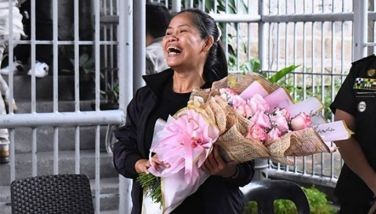DOJ: PhilHealth exec says current IT system cannot detect fraudulent claims

MANILA, Philippines — A senior officer of the Philippine Health Insurance (PhilHealth) Corp. revealed the current Information Technology system of the state insurer cannot detect fraudulent claims, the Department of Justice said Thursday.
Senior Vice President and Chief Information Officer Jovita Aragona bared this to Task Force PhilHealth, which held an investigative hearing on Wednesday, Justice Undersecretary Markk Perete, department spokesperson, said.
Aragona was one of the resource persons invited by the panel in the hearing. Others who attended are PhilHealth Corporate Secretary Jonathan Mangaoang and Acting Senior Manager of PhilHealth’s Fact-Finding Investigation and Enforcement Division (FFIED) Ernesto Barbado.
Perete said that Aragona told the task force that PhilHealth’s current IT systems are unable to detect fraudulent claims and some segments of the state insurer’s validation processes are still done manually.
This is due to “the alleged failure of its relevant offices to specify their required internal control systems during the design and development of IT systems,” the statement, citing information from Aragona, said.
The PhilHealth chief information officer also said that the state insurer intends to develop more sophisticated IT systems. She added that an investigation into the “questionable procurement of switches” of PhilHealth’s National Capital Region is currently underway.
Meanwhile, corporate secretary Mangaoang said that the controversial Interim Reimbursement Mechanism (IRM) proposed in January this year was to “ensure that hospitals and medical establishments remain financially viable in case of emergencies and fortuitous events.”
The IRM also secured an approval from the PhilHealth Board, following the recommendation of the agency’s legal sector, according to Mangaoang.
PhilHealth suspended the implementation of the IRM last week, saying this may allow the issues on the mechanism that arose from the congressional inquiry be resolved. One of the issues tackled in the hearing is the alleged favoritism in the disbursement of billions of pesos under the IRM.
The PhilHealth corporate secretary also said that the board approved the recommendation of the agency’s Protest and Appeals Department to “grant amnesty to hospitals that belatedly filed claims for reimbursement from 2011 onwards.”
“The law that created PhilHealth renders ineligible for reimbursement a claim filed beyond sixty (60) days from the discharge of a patient,” the DOJ statement further read.
Bardado, who is the acting senior manager of PhilHealth’s Fact-Finding Investigation and Enforcement Division, urged the task force to look into fake claims that their department previously reviewed.
The DOJ statement did not expound on these claims.
Task Force PhilHealth
Last weekend, DOJ said that two individuals formerly connected to PhilHealth, who requested anonymity, revealed in its first investigative hearing fraudulent schemes in the agency. These included “payment of false or fraudulent claims against the corporation, malversation of premiums and exploitation of unscrupulous personalities of the case rate system and IRM.”
Justice Secretary Menardo Guevarra is heading the high-level, inter-agency task force investigating the corruption allegations against PhilHealth. This was in compliance with President Rodrigo Duterte’s order on August 7.
Guevarra has 30 days from the formation of the panel to hand in a report on the task force’s findings and recommendations for proposed legal actions on PhilHealth officials that may be in involved in corruption or anomalies.
The Office of the Ombudsman on Wednesday ordered a six-month preventive suspension on PhilHealth officials as it continues its own part in the probe.
Guevarra said suspension order from the Ombudsman is an “independent” action of the office, “taken within the larger framework of Task Force PhilHealth.”
- Latest
- Trending

































